Have Black Voices Mattered in Publishing?
Have Black Voices Mattered in Publishing?
A while ago, I attended a one-day workshop at a Southern California library intended for writers of color. The room semi-filled with nonwhite attendees, a mix of African Americans and Latino folks; the panelists also reflected diversity. I sat on the sidelines, curious. As a facilitator of workshops at writers’ conferences going back to 2003 when I began my workshop leader role, I always noted a lack of color. Always. So I wanted to see what a workshop that aimed its content at writers of color might offer.
Unfortunately for these writers, the information offered by the three panelists (the literary agent cancelled) only skimmed the surface and I suspected not much preparation had gone into their presentations. When a workshop leader tells their audience they really want to hear about their experiences in publishing, that’s often code for ‘Fill in the time because I’m out of content.’ Most writers will oblige because we like to talk about our publishing experiences. Members of this audience did not disappoint. To the person, the information shared was dated, seriously dated with information from the the 1980s when some of these writers had been published or initially tried to get published. What struck me was this: no one on that panel disagreed or told the attendees that the industry no longer worked that way. As I recall, not one. Draw your own conclusions, writers, here were mine.
Some communities where these writers live offer inferior public-school education. Some communities where these writers live offer limited enrichment programs for their youth; enrichment implies ‘extra’ and some communities where these writers have grown up don’t have the budgetary luxury of enrichment programs. Some communities where hopeful writers live are simply underserved. Writers’ conferences cost money and time, time away from the job and/or kids that folks without much ‘expendable income’ simply can’t afford. There was a time when community colleges offered writing craft courses in Adult Ed programs; I can’t say if the range of courses my Adult Ed program offered me mirrored those in Black communities. My guess would be, probably not.
Reflecting on my own growing up working class, we didn’t have much expendable income but what we had were a choice of schools, public or catholic. My family was large, five kids, and the catholic school’s policy offered discounted tuition; the more the merrier was kind of their motto. The nuns in my school taught us well. Literature and science were top priorities in my high school. I still remember my science lab; the first of many I’ve learned in yet that one remains most vivid in my mind. My sophomore year we read Dickens almost exclusively. History was also emphasized. It would be much later when I learned how sanitized our history books were but back then, I didn’t know that and likely, most of you didn’t, either. If you’re white, perhaps reading this will remind you of stories. That’s the privilege of growing up white, even without money, most of us had options and opportunities; by comparison, we just did and still do.
Writers, use your voices. Our country is hurting. If you are white and don’t understand why you should rise to the occasion because after all, you didn’t enslave anyone, consider this: you’ve been raised in a society that has never viewed you as a descendant of enslaved human beings and therefore never treated you as such. Even if you don’t think you had privilege, do some research on what privilege means. And I’m encouraging you to write, even if it’s for your eyes only.
Have Black voices mattered in publishing? Going forward, let’s hope we read more voices that challenge our thinking about the way this world works. Ending this piece with a few sites/URLs that pay attention to diversity and if you can add to this list, please let me know. marketingthemuse@gmail.com
Here’s a list of black owned bookstores that would appreciate support from readers of all colors, (A clearer print on my Instagram page, @writersmama ). 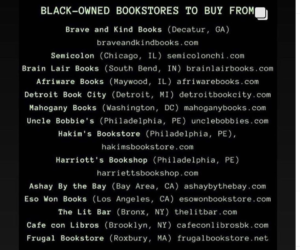
Follow this link on The Community of Literary Magazines and Presses for a reading list of authors/books devoted to social justice/diversity oriented stories, fiction and non fiction. Thanks to Jennifer Silva Redmond for this find.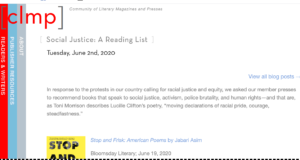
On Twitter, @DVpit describes its site as a Twitter pitch event for artists who identify with a historically marginalized community. Here’s a screenshot of #DVpit Twitter homepage.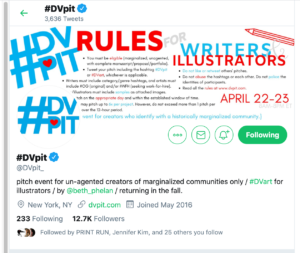
The next screenshot is the retweet, r/t, of Caitie Flum, an associate agent from Liza Dawson Associates, which is highly regarded and New York City based. Though she is closed for submissions, she wanted writers to know she’d be attending an upcoming #DVpit pitch on Twitter. Writers, note her r/t offers a glimpse into this literary agent’s interests and views. Our social media profiles tell much about who we are and what we stand for and by retweeting and sharing, we become less invisible in this world.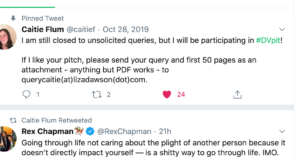
To writers who identify as white, this writer believes we must educate ourselves about social injustices that have kept people of color down just as it has bestowed privilege automatically on those born white.
Last Words: A reminder to some and invitation to all, should you be interested in attending @Writersmama Read &Critique Workshop on #Zoom; it’s been quite helpful. Our cool group, formed because of that dang virus and filled with talented writers, dig it as do I. Shoot me an email if interested. marketingthemuse@gmail.com 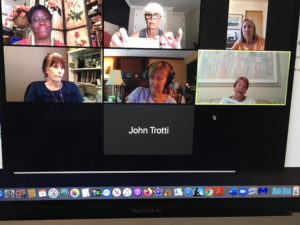
#Staysafe
#StayWoke
Marla
@writersmama
#writersMAMA
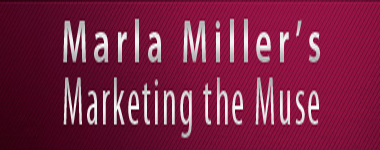

Leave a Reply